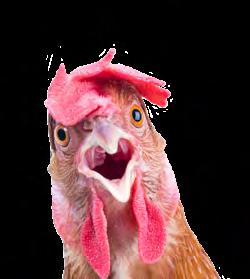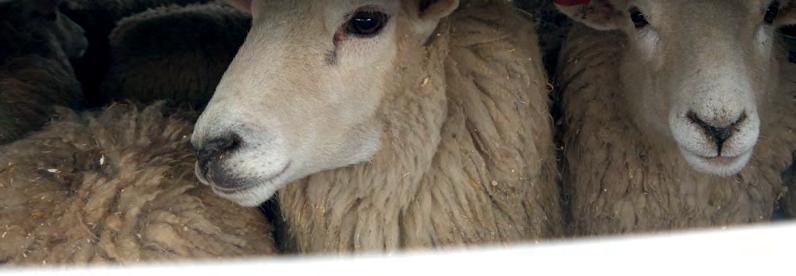
13 minute read
Is the next pandemic INTERNATIONAL AWARENESS DAY
INTERNATIONAL DAY OF AWARENESS JUNE 14TH

Advertisement
On 14th June, please join Compassion and campaigners worldwide for the fifth annual International Awareness Day against live exports.
Last year, 180 events across six continents showed true, global solidarity against the needless export of animals for slaughter and fattening.
This year, the day of action is going entirely ‘virtual’. This is due to COVID-19 restrictions on gatherings, but we hope that, as a result, people who can’t usually travel to events – and in more countries than ever – will be able to take part.
The COVID-19 pandemic has reminded us that we’re all, wherever we live, intimately connected.
What happens in China matters in Italy. What happens in the UK has an impact in Spain. And, as this shared virus shut down international travel for humans, the shameful
trade in animals between countries has continued.
June 14th is our chance to stand with other individuals and organisations fighting live exports, around the world. We are not alone, and
together our voices are deafening.
Globally, millions of farmed animals are transported over long distances every year. These animals’ essential needs cannot be met whilst cramped inside a lorry or a ship on these journeys – especially when temperatures soar in the summer months.
Yet, for the sake of a profit, exporters are quick to turn a blind eye to suffering. As a result, animals
face exhaustion, thirst, hunger, injuries, trampling or even death.
One stark example of how wrong things can go during live exports is the capsizing of the Queen Hind on 24th November 2019. Packed with 14,600 sheep, this cargo ship sank shortly after setting sail from Romania for Saudi Arabia. Tragically, despite tireless rescue efforts, only 254 sheep were pulled alive from the water and, ultimately, only 180 animals survived.
Both the extent of live exports, and their interconnectedness, make this a global problem. For example, when shipments from Australia stop, importers look to South Africa and Romania to fill the gap. If we are to end this trade, we need a worldwide solution.
On June 14th we’ll stand together against the globally connected, cruel live export industry. We will show how, also globally connected – and united – we will stop it.
TAKE ACTION ON 14TH JUNE!
It’s easy to be a part of this year’s ‘virtual’ International Awareness Day. Simply display the poster overleaf, or
take action on social media.
Visit ciwf.org.uk/AwarenessDay to find out more and join campaigners around the world. Let’s show global leaders that it’s time to
BAN LIVE EXPORTS!
INTERNATIONAL AWARENESS DAY 14TH JUNE 2020


Help end the terrible suffering of farm animals. Join campaigners around the world and take action online: CIWF.ORG.UK/AWARENESS-DAY
COMMITTING TO CHANGE FOR CHICKENS
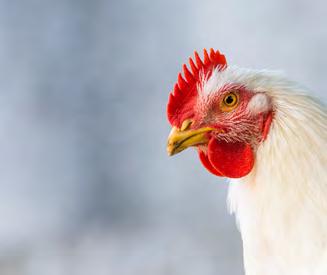
In the latest update on our campaign to transform chicken welfare, we’re delighted to report another wave of progress by food companies –
thanks to you!
HONEST LABELLING EXPANDS IN FRANCE
In February, France’s first animal welfare labelling scheme received a huge boost, when a further three,
influential businesses signed-up.
As previously mentioned in Farm Animal Voice, CIWF France has worked alongside two NGOs – LFDA and OABA – and leading supermarket chain, Casino, to develop the ‘Association Étiquette Bien-Être Animal’ label.
The ‘AEBEA’ uses nearly 230 criteria to rank chicken products on the quality of life of the animals – giving shoppers a clear choice in store. And, now, major retailers Carrefour and Système U, and France’s secondlargest poultry producer, Galliance, have joined the scheme. As a result,
the welfare label will cover more than 80 million animals a year.
Over the past few months, the label has also evolved to include additional
information on method of
production – for example ‘improved indoor’ or ‘outdoor access’ – illustrated by a pictogram. This simple information complements the detailed animal welfare assessment, which is graded from A to E.
We are hoping that AEBEA will soon extend beyond France – in particular with the support of Carrefour, which aims to introduce the label in other EU countries. We are also working to extend the labelling to other animals: next up are pigs,
so watch this space!

THE BETTER CHICKEN COMMITMENT GAINS MORE GROUND
In the UK, a recent RSCPA breed trial clearly demonstrated that slower
growing chickens lead healthier,
happier lives and provide better quality meat.
The good news is that our latest European Broiler Forum for food businesses was vastly oversubscribed, indicating an appetite for change in the industry. And, to date, over 100
companies across Europe have signed up to the Better Chicken
Commitment (BCC). These companies have pledged that, by 2026, they’ll rear slower-growing chickens in better living conditions.
Amongst the latest companies to sign up are High Street favourite, Yo Sushi, and the UK hospitality caterer CH&CO. Meanwhile, Carrefour – in addition to joining the AEBEA labelling scheme – has also committed to this big step forward for chicken welfare. And so too have the large French catering group Bertrand Restauration and retailer Franxprix (part of the Casino Group).
In January 2018, M&S was the first UK retailer to support the BCC. Two years on, they have begun to implement the changes, launching a new range of chicken that meets the higher welfare criteria. Look for the green ‘corn-fed, slower grown’ label on products in store.
Higher welfare chicken rearing systems that use slower growing breeds, such as ‘Windstreek’ in The Netherlands, offer multiple features for improved welfare.
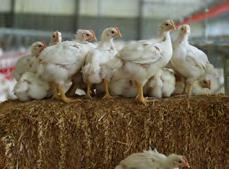

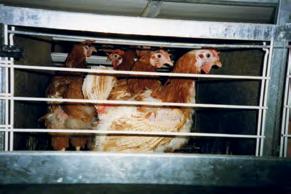
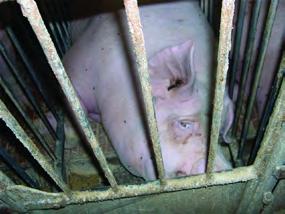
ANIMALS ARE NOT PAWNS
As the UK’s trading relationships are transformed, you are helping farm animals to get the respect they deserve.
Following its departure from the European Union, the UK is seeking to negotiate new trade deals with countries around the world.
This already mammoth task has been made more complex by COVID-19. And, throughout these high-pressure negotiations, we must ensure farm animals aren’t treated like pawns – their welfare traded away for the sake of a deal.
If the UK requires all meat, egg and dairy imports to meet domestic animal welfare law, this will help protect humane farming in the country and leave the door open for further improvements in UK standards. It could also benefit animals around the world by cutting demand for low welfare food.
Alternatively, these deals could lead to imports of chlorinated or acid-washed chicken, hormone-treated beef, and eggs from hens kept in barren cages. British shoppers may unwittingly buy into animal suffering elsewhere, and higher welfare farmers in the UK could be threatened by cheaper, crueller competition. Thanks to you, earlier this year, Compassion persuaded MPs to table an amendment to the new Agriculture Bill, which would have required agricultural imports to comply with UK animal welfare standards. And, following emails from thousands of Compassion supporters, 277 MPs voted for the amendment – including 22 Conservative politicians who defied the Whip and rebelled against the Government.
Unfortunately this wasn’t enough to get the legislation changed. It did lead to a Government statement that ‘inspections’ would prevent the import of hormone-treated beef or chemically-treated chicken. But more concrete action is needed. The Agriculture Bill will now be considered by the House of Lords, where there has previously been strong support for protecting animal welfare standards in trade deals. So, we’ll be lobbying hard for the amendment to be reintroduced at that stage.
And we won’t stop there. Last year we secured a similar change to a Bill that would have replicated trade deals the UK had, through EU membership, with countries such as Canada, Switzerland and South Korea. However, because of the general election, this Bill did not become law. A new Trade Bill has now been published and we are once more demanding that it requires imports to meet UK welfare standards.
So, in the coming months:
• Compassion’s lobbying team will continue to give UK Ministers clear policy advice and set out the costs of lower welfare imports for animals and society
• We will continue to help compassionate citizens to contact leaders and decision-makers
• And we will publicise the truth about unhealthy, inhumane imports to show consumers that a bad deal for farm animals is a bad deal for us all.
The task ahead is not straightforward but – throughout every stage of every trade deal – together, we will be the voice for farm animals.
ACT NOW!
A huge thank you to everyone who has responded so generously to our ‘Animals not pawns’ appeal. It’s not too late to donate, or find out more, at ciwf.org.uk/Animals-Not-Pawns
Do you receive email updates from Compassion? Visit ciwf.org.uk and click ‘sign up’ to get all the latest news and actions you can take to protect farm animals.
AROUND THE WORLD IN 80 (WELL, ABOUT A DOZEN) POLICIES!
Despite the slowdown in Government policymaking caused by COVID-19, you’re still convincing politicians worldwide to take action for farm animals.
CIWF UK’s Senior Policy Manager, James West, reports.
PROTECTING ANIMALS AFTER BREXIT
The UK Prime Minister, Boris Johnson, has repeatedly said the country can
stop the live export of animals
after leaving the EU. So, now let’s get this done! We are expecting a Government consultation on this issue shortly, and we’ll continue the call for a total ban on exports for slaughter and fattening. Pages 6-7 set out how you are keeping this crucial issue in the political spotlight.
Compassion has also launched a Judicial Review against the Scottish Government’s disgraceful, ongoing approval of live exports of unweaned calves. We argue that these shipments are illegal under current law, and we’re taking the matter to court. See page 8 for more details.
Meanwhile, in Westminster,
Compassion was twice invited to give evidence to parliamentary
committees about the animal welfare implications of the new Agriculture Bill. And, as a result of these meetings, plus our direct lobbying of MPs, a number of important amendments were tabled to the Bill.
These proposed changes included
prohibiting imports that don’t meet UK animal welfare, environmental or plant health
standards. This would have helped to prevent higher welfare British farming being undermined by poor trade deals, and it gained strong cross-party support (see page 12 for more details).
Another amendment would have required the Government to introduce
mandatory labelling of meat and dairy products by method
of production. This cornerstone demand of Compassion’s Honest Labelling campaign would give shoppers the chance to make informed decisions about the food they buy, and could transform the lives of millions of animals.
The labelling amendment to the Agriculture Bill was not voted on in Parliament. However, following campaigning by Compassion supporters, when the Bill was debated on 13th May, Defra Parliamentary
Under Secretary, Victoria Prentis, announced that the Government will launch a consultation on labelling after the Brexit
transition period. This is a significant step forward, and we will be holding Government to account for this promise.
And, finally, after a delay caused by the General Election, Parliament has now debated two petitions
that each received over 100,000
signatures from campaigners like you. One petition called for UK law to recognise that animals can think and feel. The other demanded an end to the Cage Age in UK farming.
As you, and supportive MPs, urged, the Government committed to
bringing forward legislation to
recognise animal sentience – although it wouldn’t guarantee to deliver the law this year.
Meanwhile, Kerry McCarthy MP began the debate about caged farming by highlighting the inherent cruelty of cages. She pointed out that “even with the best care and stockmanship” a mother pig will suffer if she is confined so that she cannot turn around. And Defra Under-Secretary of State, Victoria Prentis later made a very encouraging announcement. She stated it was
the Government’s ambition “that farrowing crates should no longer be used for sows”.
This is a massive step forward in our campaign to End the Cage Age, thanks to you.
UK citizens have also played a key role in our European Citizen’s Initiative to End the Cage Age. Turn to page 16 for the latest news on this groundbreaking campaign.
Politicians, celebrities and the media all stand up for farm animals during the UK Parliament debate on caged farming.
POSITIVE PROGRESS FROM EUROPE TO AUSTRALIA
Beyond the UK, our campaign
to improve rabbit welfare has
received a boost from the European Food Safety Agency (EFSA). It published a report criticising the use of conventional cages to farm rabbits for meat. It found the welfare of animals in these cages was likely to be lower, particularly in terms of their ability to move.
EFSA’s advice follows a call from MEPs for a ban on caged rabbit farming, backed by 600,000 European citizens like you. So, we’ve called on the new EU Commission to better protect rabbits, and introduce new, species-specific legislation. This would be a huge win for rabbits who, in numbers, are the second most caged farm animal in the EU.
Meanwhile, the French Government has announced that, by 2021, it intends to end the shameful culling
of male chicks unwanted by the egg industry, and the castration of piglets without anaesthetic.
There are no plans for legislation, but we welcome both announcements, and CIWF France will be sure to hold the Government to account.
In February, the German Bundesrat (upper house of parliament) was set to vote on a shocking proposal to weaken a ban on cages in which sows can’t stretch their legs. The plan threatened to keep mother pigs in stalls and crates for at least 15 more years. Animal welfare groups were appalled and, thanks to continent
wide petition signatures and social media campaigning, the
vote was postponed. We remain vigilant, but thank you to everyone who responded to our urgent call to action.
Compassion’s German representative, Maria Guesser, lobbying to ‘Set the sows free’ outside the German Bundesrat in Berlin.
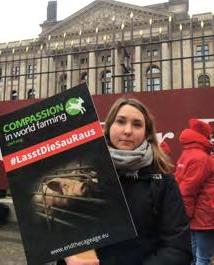
In Spain, for the first time ever, there will be an animal welfare division in the government. CIWF’s Spanish representative, Patricia De Rada, identifies this as an important sign of changing political attitudes in a country that is, sadly, a hotbed of factory farming. Although overshadowed by COVID-19, the US presidential election still looms large this year. It remains to be seen whether a trade deal between the UK and the USA will be finalised before the election, or what effect the result will have on that process. Watch this space for news about how you can help protect farm animals on both sides of the ‘pond’.
Finally, in exciting news, live sheep exports have now been permanently banned from Australia to the Middle East during the hottest 3.5 months
of the year. This hugely positive step follows relentless pressure from campaigners, including our friends at Animals Australia. See page 9 for details of this year’s Ban Live Exports International Awareness Day, and stand in solidarity with campaigners around the world.
